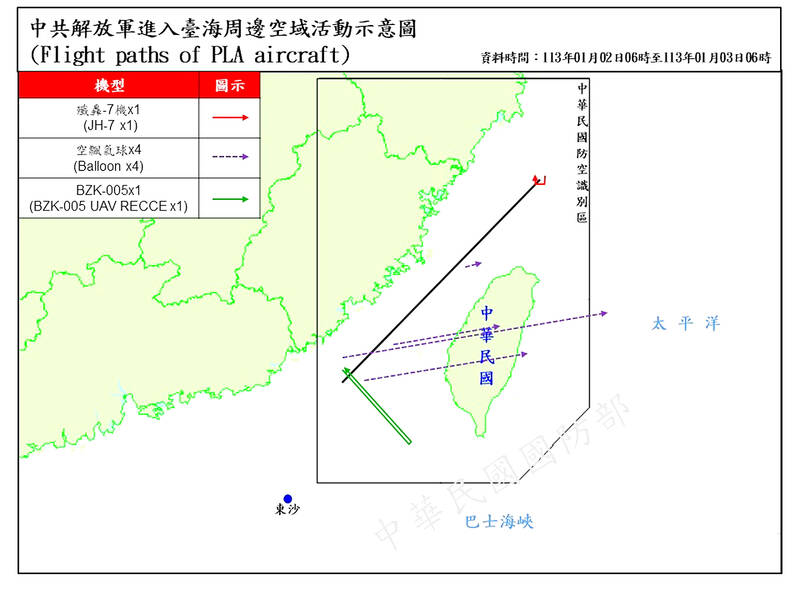Four Chinese balloons on Tuesday drifted across the Taiwan Strait, with three of them crossing over Taiwan proper, the Ministry of National Defense said yesterday, following two more sightings the day before.
Tuesday’s balloons all drifted northeast and disappeared at 10:48am, 5:18pm, 7:01pm and 7:02pm, the ministry said.
They were floating at altitudes of 3,658m, 5,486m, 6,706m and 7,315m respectively, it said, adding that it was the ninth time Chinese balloons had been detected since last month.

Photo courtesy of the Ministry of National Defense
On Monday, two balloons were sighted, one of which crossed over Taiwan proper.
Ministry spokesman Sun Li-fang (孫立方) did not say whether the military believed the latest balloons were for weather or espionage purposes, but the ministry has previously said that most Chinese balloons flying in the area were weather balloons.
The military closely monitors the balloons’ movements and informs civil aviation authorities, Sun said.
“The nation’s armed forces respond appropriately to unidentified balloons found entering Taiwan’s airspace based on the level of threat they pose to national security,” he said, without elaborating.
The ministry last year said that similar devices had been regularly detected around Taiwan, most often between the months of December and February, as seasonal winds bring the balloons closer to Taiwan.
The military does not believe the balloons are directly related to Taiwan’s presidential and legislative elections, to be held on Saturday next week, Sun told a ministry news briefing on Tuesday last week.
Ou Si-fu (歐錫富), a research fellow at the Institute for National Defense and Security Research, said that the balloons are “for military coercion and psychological warfare.”
“The presidential election is coming and balloons are a kind of military intimidating tool,” he said, adding that China wants more “pro-Beijing votes.”
In the 24 hours ending at 6am yesterday, the ministry also detected nine Chinese People’s Liberation Army aircraft and four navy vessels operating near Taiwan.
Two of the aircraft — a Xian JH-7 bomber and a Harbin BZK-005 reconnaissance drone — crossed the median line of the Taiwan Strait into the nation’s north and southwest air defense identification zone, the ministry said.
Beijing has in the past few years ramped up military and political pressure on the government of President Tsai Ing-wen (蔡英文), and also refused to engage with her during her tenure.
It has sent an unprecedented number of warplanes and naval vessels around Taiwan, dubbed by military experts as “gray zone” tactics designed to intimidate Taiwanese.

ENDEAVOR MANTA: The ship is programmed to automatically return to its designated home port and would self-destruct if seized by another party The Endeavor Manta, Taiwan’s first military-specification uncrewed surface vehicle (USV) tailor-made to operate in the Taiwan Strait in a bid to bolster the nation’s asymmetric combat capabilities made its first appearance at Kaohsiung’s Singda Harbor yesterday. Taking inspiration from Ukraine’s navy, which is using USVs to force Russia’s Black Sea fleet to take shelter within its own ports, CSBC Taiwan (台灣國際造船) established a research and development unit on USVs last year, CSBC chairman Huang Cheng-hung (黃正弘) said. With the exception of the satellite guidance system and the outboard motors — which were purchased from foreign companies that were not affiliated with Chinese-funded

PERMIT REVOKED: The influencer at a news conference said the National Immigration Agency was infringing on human rights and persecuting Chinese spouses Chinese influencer “Yaya in Taiwan” (亞亞在台灣) yesterday evening voluntarily left Taiwan, despite saying yesterday morning that she had “no intention” of leaving after her residence permit was revoked over her comments on Taiwan being “unified” with China by military force. The Ministry of the Interior yesterday had said that it could forcibly deport the influencer at midnight, but was considering taking a more flexible approach and beginning procedures this morning. The influencer, whose given name is Liu Zhenya (劉振亞), departed on a 8:45pm flight from Taipei International Airport (Songshan airport) to Fuzhou, China. Liu held a news conference at the airport at 7pm,

AIR SUPPORT: The Ministry of National Defense thanked the US for the delivery, adding that it was an indicator of the White House’s commitment to the Taiwan Relations Act Deputy Minister of National Defense Po Horng-huei (柏鴻輝) and Representative to the US Alexander Yui on Friday attended a delivery ceremony for the first of Taiwan’s long-awaited 66 F-16C/D Block 70 jets at a Lockheed Martin Corp factory in Greenville, South Carolina. “We are so proud to be the global home of the F-16 and to support Taiwan’s air defense capabilities,” US Representative William Timmons wrote on X, alongside a photograph of Taiwanese and US officials at the event. The F-16C/D Block 70 jets Taiwan ordered have the same capabilities as aircraft that had been upgraded to F-16Vs. The batch of Lockheed Martin

GRIDLOCK: The National Fire Agency’s Special Search and Rescue team is on standby to travel to the countries to help out with the rescue effort A powerful earthquake rocked Myanmar and neighboring Thailand yesterday, killing at least three people in Bangkok and burying dozens when a high-rise building under construction collapsed. Footage shared on social media from Myanmar’s second-largest city showed widespread destruction, raising fears that many were trapped under the rubble or killed. The magnitude 7.7 earthquake, with an epicenter near Mandalay in Myanmar, struck at midday and was followed by a strong magnitude 6.4 aftershock. The extent of death, injury and destruction — especially in Myanmar, which is embroiled in a civil war and where information is tightly controlled at the best of times —